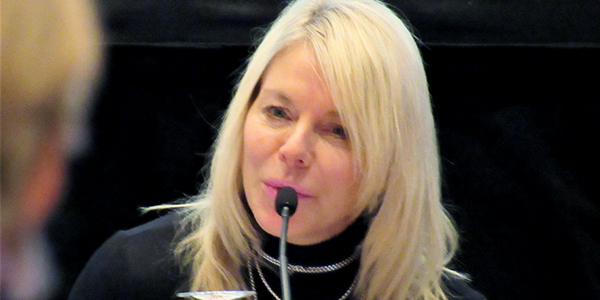By Amanda Durish Cook
INDIANAPOLIS — MISO’s Advisory Committee has decided not to pursue changes to how the RTO vets and selects its Board of Directors after more than a year of discussion and the creation of a special task team to explore the issue.
The AC said Wednesday it would not recommend changes to expand the stakeholder voice on MISO’s Nominating Committee, declining all possible options laid out by the Board Qualification Task Team (BQTT). (See Task Team: Boost Member Role in MISO Board Selection.)
“The result was to maintain the status quo,” AC Chair Audrey Penner told members at a committee meeting Wednesday.
Penner said that while some stakeholders might have wanted to see change, she hoped members saw the value of what she called a high-functioning board.
Board Chair Phyllis Currie said she expected the AC would continue to periodically examine the board’s makeup.
“In this kind of organization, that conversation will come up time and time again,” she told Penner at the board’s meeting Thursday.
The BQTT in September released a list of options that included requiring state and federal regulators to observe a yearlong “cooling-off” period before becoming eligible for nomination to the board, possibly reserving one of the nine director seats for those with experience representing utility customer interests, and doubling the number of stakeholder representatives from two to four on the Nominating Committee that selects board candidates.
Another option would have rotated the sectors from which stakeholder participants are drawn for the Nominating Committee or reserved a designated seat for a member of the Organization of MISO States. A final option would have set aside one of the nine director seats for someone with recent experience representing electric utility customer interests.
Had the AC recommended any changes, they would have gone before the board’s Corporate Governance and Strategic Planning committees as suggestions only.
The BQTT was created in response to last year’s election of Minnesota Public Utilities Commission Chair Nancy Lange to the board while she was still serving on the commission. Some stakeholders questioned the independence of sitting regulators appointed to the RTO’s oversight body. (See MISO Members Uneasy over Board Nomination.)
OMS has also sent a short letter to the board conveying its “strong interest to be a regular and active participant in the Nominating Committee,” according to organization President Matt Schuerger. One of the Nominating Committee’s two stakeholder seats is typically reserved for an OMS representative. Schuerger said he expected regulator participation to continue shaping the board’s makeup.





